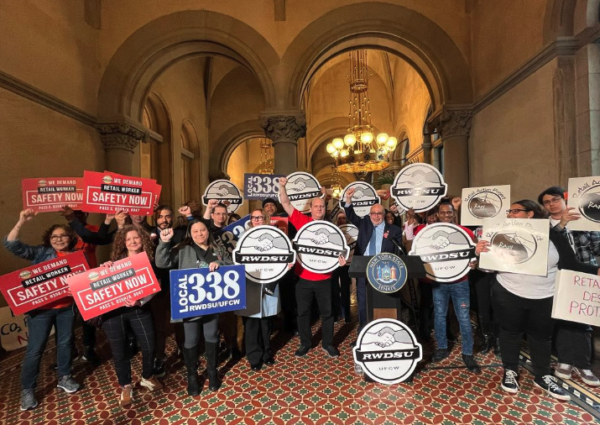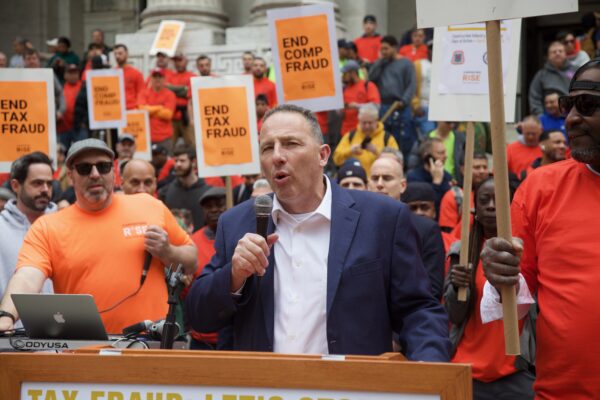Brookwood, Ala.—The strike by 1,000 miners at Warrior Met Coal in Brookwood, Alabama will reach the six-month mark on Oct. 1, but the company’s management is showing no signs of seriously seeking an agreement, a United Mine Workers of America [UMWA] official said Sept. 28.
“This company is doing everything they can to keep the union out of these mines,” UMWA District 20 Vice-President Larry Spencer said during an online seminar hosted by the Alliance for Global Justice. “These guys that are risking their lives, [Warrior Met Coal doesn’t] want to give them a fair wage for mining the coal.”
Management’s latest contract offer, he said, would also give the company power to fire miners for conduct on the picket line —such as “calling a scab a scab” — after a company-conducted hearing where they couldn’t bring a union representative to defend them. It would also give strikebreakers seniority over union miners when they return to work.
The union, Spencer said, is not asking for much: Pay and benefits comparable to those at the nearby mines at the southwestern tail of the Appalachian coal belt, and rolling back the concessions workers made when the mine was bankrupt five years ago. They took a $6-an-hour pay cut and higher health-care costs, and gave up most of their overtime pay and paid holidays to help the company regain solvency. Since then, they’ve been working 10 to 12 hours a day, six or seven days a week.
“They want your family to enjoy the holiday, and for you to go home and eat the cold barbeque,” he said.
In September, he noted, UMWA Local 1948 members at the Shoal Creek mine in McCalla, about 25 miles away, ratified a contract that, according to the national UMWA, included pay increases, a $5,000 signing bonus, and “health care provisions consistent with the UMWA’s national coal agreement.” Like the cluster of mines in Brookwood, Shoal Creek mines metallurgical coal — coal used in manufacturing steel.
That 100% health-care coverage is important for miners, Spencer said, because the work frequently has long-term physical consequences — from bad backs to black lung.
Warrior Met can afford to go back to the 2016 pay and benefits, he said: Coal prices are now at a record high of $460 per ton. While that won’t last, he continued, company officials “told us they could afford the old contract at $150.”
With Warrior Met intransigent, the union hopes to have influence through its business connections. It is planning informational picketing at the port in Mobile, Alabama, where Brookwood coal is shipped from, and to return to New York for another protest at BlackRock Fund Advisors, the investment firm whose 13% share makes it the largest single owner of Warrior Met.
“These people need to understand what they’re investing in,” Spencer said.
BlackRock is sidestepping the issue, saying its investments are largely in automatically selected index funds.
Government has been on management’s side, Spencer added, with state troopers escorting buses full of strikebreakers as they speed toward the mines. But the local community has responded generously, said Haeden Wright, a teacher and miner’s wife who is a leader in the spouses’ auxiliary at two of the mining facilities on strike.
It costs $3,000 a week to run the strike, she said, from buying water for picketers to running a pantry that gives out 200 bags of food. On Thursdays, they give out clothing and hygiene items like toothbrushes and shampoo, as well as baby supplies — diapers, wipes, and formula can cost $60 a week, Wright said. They also gave out backpacks and supplies when children returned to school.
A local grocery has allowed the unions to buy in bulk, which has enabled it to save money, and three months before Christmas, it’s already received 275 donated toys, she says. Contributions have come in from almost every state and from British unions in the South Wales coal belt.
On Wednesday evenings, the UMWA locals hold a rally at nearby Tannehill State Park. Wright said her 7-year-old calls the other kids there “my strike cousins.”
National unions have also helped, said Spencer, including the AFL-CIO, the Retail, Wholesale and Department Store Union [RWDSU], the Association of Flight Attendants, and the United Steelworkers.
The miners’ walkout is about protecting everyone’s job, he said. If Warrior Met can beat the union and preserve its pay and benefit cuts, “this could spread to other industries.”


